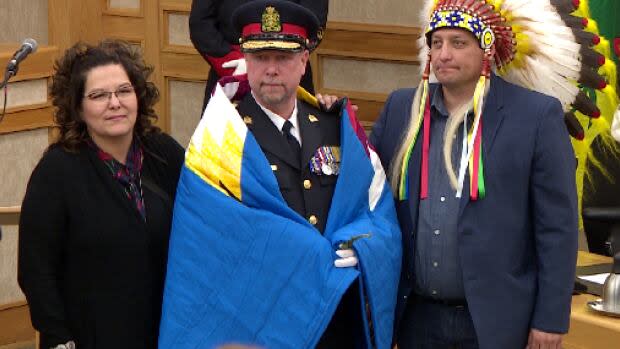BLM, pandemic, fentanyl and rising budgets define Troy Cooper's tenure as Saskatoon's top cop

Troy Cooper didn't get much of a grace period when he took over Saskatoon's top policing job in February 2018.
The city set a record for homicides that year — 13 violent deaths — and then followed it again with another record, 16 people killed, in 2019.
Guns, gangs and crystal meth were driving crime in the city.
Then 2020 hit.
The arrival of the COVID-19 pandemic that March changed lives across the globe. Masks, vaccinations, travel restrictions and distancing regulations all came into effect. But not everyone agreed — including some Saskatoon police.
"That was a surprise to me. I don't know if I was just naive, but I didn't expect to see that," Cooper said in an interview.
"I don't know why I didn't expect it, because in every industry there was a percentage of people that didn't feel the government policies were appropriate."
In May 2020, police in Minneapolis murdered George Floyd. The next month, a Black Lives Matter march was organized in Saskatoon. Some 3,000 people, including police and civilian staff, moved through the downtown.
Cooper still shakes his head at the memory.
"Civilian staff and other officers wanted to participate and we thought, this is awesome, right?," he said.
"And then we realized they were marching to the police station, because we were sort of seen as an institution that supported racism where they had racial bias, and it was quite an awakening, to be honest."
Cooper said he has watched crystal meth and fentanyl cut a swath through the community.
The latest figures say there were 204 confirmed and 217 suspected drug deaths in the province in 2022. That's a total of 421 deaths compared to 401 in 2021, which itself was the previous record.
"We have officers that are supplying naloxone to the people who are overdosing, many times, and that's again not not a traditional police role. It's not something we train for and it impacts you emotionally. You know, you're not a medical professional … you're a police officer who shows up for the potential of a crime or violence and then now you're thrust into a different role," he said.
"So it's hard for our staff and so we've had to address it through increasing and strengthening our mental health strategy to make sure that there are resources available, because an officer can't do a good job in the community if he needs to get healthy himself."
Cooper is exiting the job not long after budget deliberations wrapped up for the 2024 policing season. Since becoming chief, the budgets have increased, on average, 4.6 per cent each year.
Cooper said policing is not likely to get less expensive in the future.
"I think, if we don't grow as a population, then at least there's inflationary costs that are going to impact police budgets," he said.
"But certainly in a city like ours, we grow by the population of Humboldt every year. So that takes resources and takes infrastructure. Policing is one of those levels of infrastructure and it should be expected as we grow that there's going to be those needs."
